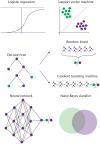Artificial intelligence in orthopaedics: false hope or not? A narrative review along the line of Gartner's hype cycle
- PMID: 33204501
- PMCID: PMC7608572
- DOI: 10.1302/2058-5241.5.190092
Artificial intelligence in orthopaedics: false hope or not? A narrative review along the line of Gartner's hype cycle
Abstract
Artificial Intelligence (AI) in general, and Machine Learning (ML)-based applications in particular, have the potential to change the scope of healthcare, including orthopaedic surgery.The greatest benefit of ML is in its ability to learn from real-world clinical use and experience, and thereby its capability to improve its own performance.Many successful applications are known in orthopaedics, but have yet to be adopted and evaluated for accuracy and efficacy in patients' care and doctors' workflows.The recent hype around AI triggered hope for development of better risk stratification tools to personalize orthopaedics in all subsequent steps of care, from diagnosis to treatment.Computer vision applications for fracture recognition show promising results to support decision-making, overcome bias, process high-volume workloads without fatigue, and hold the promise of even outperforming doctors in certain tasks.In the near future, AI-derived applications are very likely to assist orthopaedic surgeons rather than replace us. 'If the computer takes over the simple stuff, doctors will have more time again to practice the art of medicine'.76 Cite this article: EFORT Open Rev 2020;5:593-603. DOI: 10.1302/2058-5241.5.190092.
Keywords: artificial intelligence; computer vision; data-driven medicine; machine learning; orthopaedic surgery; orthopaedic trauma; personalized medicine; prediction tools.
© 2020 The author(s).
Conflict of interest statement
ICMJE Conflict of interest statement: JD reports receipt of a grant from Marti-Keuning Eckhardt Foundation for the submitted work. The other authors declare no conflict of interest relevant to this work.
Figures





References
-
- Peterson ED. Machine learning, predictive analytics, and clinical practice: can the past inform the present? JAMA 2019;November 22. - PubMed
-
- Goldman L, Cook EF, Johnson PA, Brand DA, Rouan GW, Lee TH. Prediction of the need for intensive care in patients who come to emergency departments with acute chest pain. N Engl J Med 1996;334:1498–1504. - PubMed
-
- Reilly BM, Evans AT, Schaider JJ, et al. Impact of a clinical decision rule on hospital triage of patients with suspected acute cardiac ischemia in the emergency department. JAMA 2002;288:342–350. - PubMed
Publication types
LinkOut - more resources
Full Text Sources

